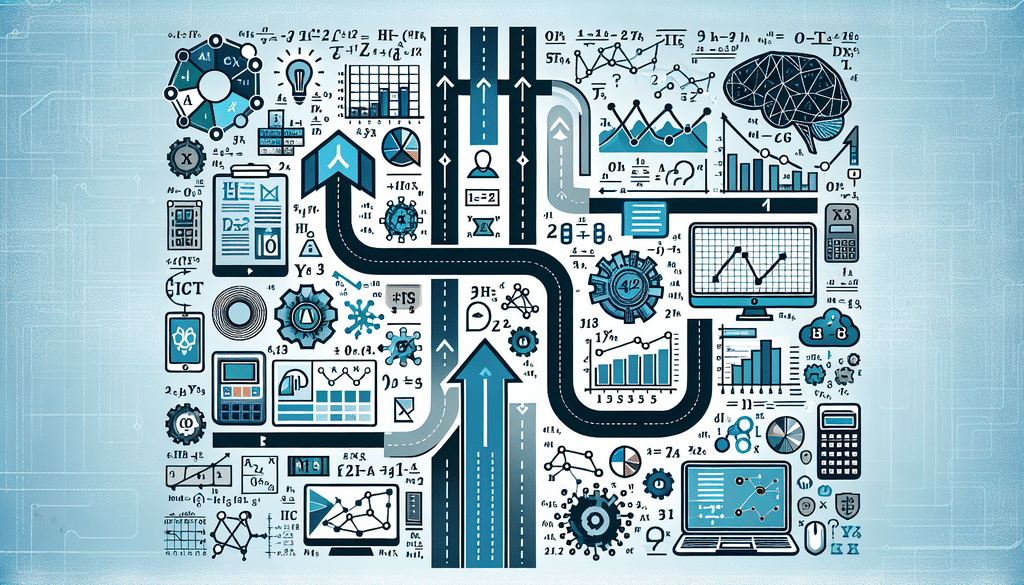In today’s data-driven world, the role of a data scientist has emerged as one of the most sought-after careers. However, succeeding in this field requires more than just an interest in data and coding. A solid foundation in mathematics is crucial for interpreting data, building algorithms, and making sense of statistical analyses. Therefore, aspiring data scientists should focus on developing certain essential maths skills. This article will explore the mathematical competencies that are vital for anyone looking to break into the field of data science.
Core Mathematical Foundations
At the heart of data science lies mathematics, which serves as a toolkit for analyzing and interpreting data. Here are some of the core areas of mathematics that aspiring data scientists should master:
- Linear Algebra – This field of mathematics deals with vectors and matrices, which are fundamental in various algorithms and data manipulation tasks.
- Calculus – Understanding derivatives and integrals is crucial for optimization problems, particularly in machine learning algorithms.
- Probability and Statistics – Knowledge of these disciplines will help data scientists in drawing conclusions and making predictions based on data.
Importance of Linear Algebra
Linear algebra is indispensable to data science. It involves solving systems of linear equations and performing operations on matrices and vectors. Here’s why it’s so essential:
- Many data science tasks can be represented as vector spaces, allowing data scientists to perform various operations in a more efficient manner.
- Machine learning algorithms often rely on matrix operations, making it crucial for data manipulation.
- Dimensionality reduction techniques, such as Principal Component Analysis (PCA), rely heavily on linear algebra concepts.
Overall, a good grasp of linear algebra is imperative for effectively working with large datasets and understanding how data is represented in a multidimensional space.
Importance of Calculus
Calculus is another key area in the mathematics toolkit of data scientists. Here’s how it plays a role:
- Optimization – Many machine learning algorithms work by minimizing (or maximizing) a certain quantity. Understanding how to use derivatives helps in finding local minima or maxima.
- Calculus allows for the understanding of rate of change, which is fundamental in creating predictive models.
- Integral calculus can help visualize the area under curves, a concept useful for understanding probability density functions.
Mastering calculus equips aspiring data scientists with the ability to develop more sophisticated models that can learn from data in a nuanced way.
Probability and Statistics
Statistics is the cornerstone of making inferences from data. Here’s why it’s indispensable:
- Data scientists need to understand fundamental statistical concepts, including mean, median, mode, variance, and standard deviation.
- Probability theory provides the framework for making predictions about data and understanding how uncertainty impacts decision-making.
- Statistical methods are vital for hypothesis testing and for generating insights from exploratory data analysis.
These skills not only enhance the capability to analyze data but also enable data scientists to communicate their findings effectively to a non-technical audience.
Programming and Mathematical Software
While strong mathematical skills are essential, being proficient in programming languages and mathematical software can significantly enhance a data scientist’s effectiveness. Here are some critical languages and tools:
- Python – Known for its simplicity and flexibility, Python is widely used in data science for data manipulation and analysis. Libraries like NumPy and Pandas are built on fundamental mathematical concepts.
- R – This language is specifically designed for statistics and data analysis. R’s built-in statistical functions enable advanced data analysis with minimal coding.
- Mathematical Software – Tools like MATLAB or Mathematica are highly effective for performing complex calculations and visualizations, especially in linear algebra and calculus.
Continuous Learning and Application
Mathematics is a vast subject, and the learning never stops. For aspiring data scientists, continuous education and real-world application of mathematical concepts are essential. Here are some recommendations:
- Enroll in online courses or workshops focusing on specific mathematical skills.
- Participate in data science bootcamps that offer hands-on experience.
- Join online forums and communities where data scientists discuss mathematical problems and solutions.
- Work on personal projects or open-source contributions that require the application of mathematical concepts.
Conclusion
For aspiring data scientists, a robust understanding of essential mathematical skills is non-negotiable. Mastering linear algebra, calculus, probability, and statistics paves the way for successful data analysis and predictive modeling. Coupled with programming proficiency, continuous learning, and practical application, these mathematical skills will empower aspiring data scientists to navigate and excel in this dynamic field.
As data continues to proliferate and evolve, the demand for skilled professionals who can leverage mathematics to derive meaningful insights will undoubtedly increase. Therefore, investing time and effort in honing these mathematical skills is a crucial step towards a successful career in data science.





